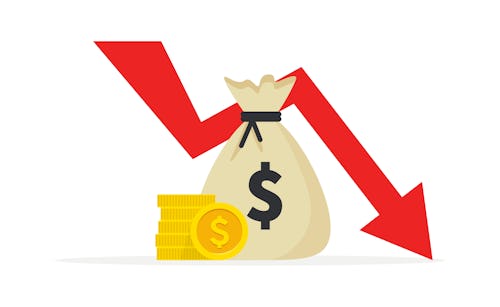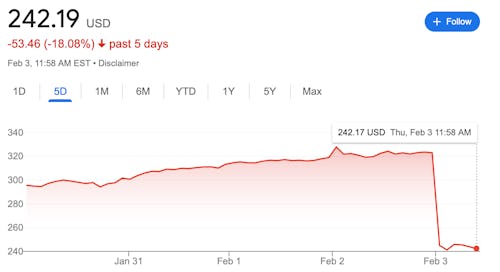
Just as the stock market was closing Wednesday, Facebook dropped a data bomb: It had, for the first time in 18 years, lost monthly users. As you might expect under such circumstances, Meta’s stockholders responded to the news almost immediately. The company had lost nearly a quarter of its value by the time the market opened back up this morning.

It’s a historic moment for the world’s largest social network, though not exactly in the way Meta would like. Facebook stock has never in a single day lost so much value; the nearest runner-up is the 19 percent drop it faced in July 2018. That drop was spurred by a number of compounding factors, including the fallout of the Cambridge Analytica scandal.
All told, Meta is now worth approximately $689 billion — obviously nothing to sneer at, but still about $210 billion less than its total market valuation just 24 hours ago. That huge pivot to the “metaverse” isn’t exactly paying off in value.
A small but significant drop —
Meta’s earnings call yesterday wasn’t all bad — the company still brought in $33.67 billion in revenue that quarter. But its newly forecasted revenue total of $27 billion to $29 billion is a few billion short of analyst expectations, bogged down in no small part by Apple’s new tracking transparency features.
And then there’s the matter of daily active users (DAU). An average of about 1.93 billion people are still logging into Facebook each day — about half a million less than the year prior. That’s not exactly a massive drop, in context, but it’s certainly significant given that Facebook has never before seen its DAU count trend downward.
About that metaverse… —
Fret not; Facebook still has hope yet. The number of monthly active users did still increase, which means people are at the very least logging in from time to time. But increasing competition from youth-focused apps like TikTok threatens to topple Facebook’s throne more with every passing day.
In the face of this heavy competition, CEO Mark Zuckerberg has made some very, uh, interesting business decisions. One example that springs to mind is his decision to rebrand the company to center entirely on the metaverse. That pivot won’t pay off for a very long time, so for now Meta is very much relying on its flagship products — Facebook, Instagram, and WhatsApp, mostly — to carry the revenue burden. The downward-trending trajectory for the original News Feed doesn’t bode well for Meta’s future.







